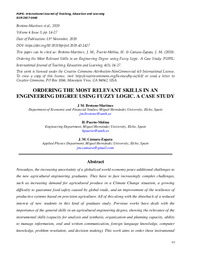Please use this identifier to cite or link to this item:
https://hdl.handle.net/11000/33274Full metadata record
| DC Field | Value | Language |
|---|---|---|
| dc.contributor.author | Brotons, Jose M | - |
| dc.contributor.author | Puerto-Molina, H. | - |
| dc.contributor.author | Cámara-Zapata, José-María | - |
| dc.contributor.other | Departamentos de la UMH::Estudios Económicos y Financieros | es_ES |
| dc.date.accessioned | 2024-09-23T12:38:37Z | - |
| dc.date.available | 2024-09-23T12:38:37Z | - |
| dc.date.created | 2020-11-13 | - |
| dc.identifier.citation | International Journal of Teaching, Education and Learning, Volume 4 Issue 3, pp. 14-27 | es_ES |
| dc.identifier.issn | 2457-0648 | - |
| dc.identifier.uri | https://hdl.handle.net/11000/33274 | - |
| dc.description.abstract | Nowadays, the increasing uncertainty of a globalized world economy poses additional challenges to the new agricultural engineering graduates. They have to face increasingly complex challenges, such as increasing demand for agricultural produce in a Climate Change situation, a growing difficulty to guarantee food safety caused by global trade, and an improvement of the resilience of productive systems based on precision agriculture. All of this along with the drawback of a reduced interest of new students in this kind of graduate study. Previous works have dealt with the importance of the general skills in an agricultural engineering degree, showing the relevance of the instrumental skills (capacity for analysis and synthesis, organization and planning capacity, ability to manage information, oral and written communication, foreign language knowledge, computer knowledge, problem resolution, and decision making). This work aims to order these instrumental skills to face the above-mentioned challenges in a more effective way. We are aware that the result of this order presents high doses of uncertainty and ambiguity, and that is why we propose the use of fuzzy logic. The application of this methodology based on fuzzy mathematics can contribute to updating the university degrees so that graduates can successfully the new challenges they will encounter in the workplace. Results show that capacity for analysis and synthesis, organization and planning capacity, and foreign language knowledge is the best-considered skills. | es_ES |
| dc.format | application/pdf | es_ES |
| dc.format.extent | 14 | es_ES |
| dc.language.iso | eng | es_ES |
| dc.publisher | IHS Publication | es_ES |
| dc.rights | info:eu-repo/semantics/openAccess | es_ES |
| dc.rights.uri | http://creativecommons.org/licenses/by-nc-nd/4.0/ | * |
| dc.subject | Agricultural Engineering | es_ES |
| dc.subject | Climate Change | es_ES |
| dc.subject | Skills | es_ES |
| dc.subject | Fuzzy | es_ES |
| dc.subject.other | CDU::3 - Ciencias sociales::33 - Economía | es_ES |
| dc.title | Ordering the most relevant skills in an engineering degree using fuzzy logic. A case study | es_ES |
| dc.type | info:eu-repo/semantics/article | es_ES |
| dc.relation.publisherversion | https://doi.org/10.20319/pijtel.2020.43.1427 | es_ES |

View/Open:
2020 PUPIL 2483-Article Text-8658-1-10-20201113.pdf
854,1 kB
Adobe PDF
Share:
.png)
